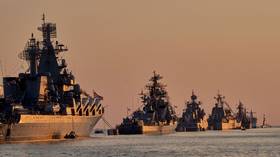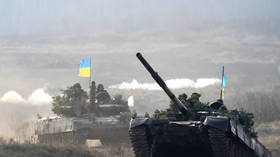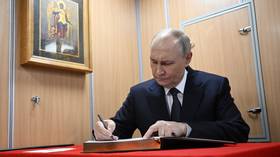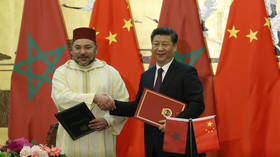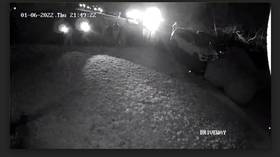Is Putin set on conquering Europe at any cost?
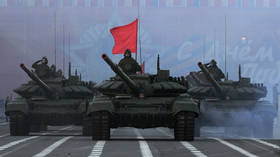
The new year has begun in much the same way as the old one ended: with predictions that Russia could invade Ukraine before the snow melts. Behind these as-yet-unfulfilled prophecies, however, are some fairly shaky assumptions.
There are two factors behind any potential threat: capability and intention. There is little doubt that Russia has at its disposal the military force required to invade Ukraine. The question is whether it intends to do so. Underpinning the widespread belief that it does is an assumption that Russia is a malign actor, intent on doing bad things for the sake of doing bad things.
Typical of this kind of thinking is an article by Anne Applebaum published this week in The Atlantic. Analyzing Russian President Vladimir Putin’s intentions, Applebaum tells readers Putin aims to “reinforce his autocracy, undermine all democracies – and push Russian political influence as far as it will go. Break up NATO. Destroy the European Union. Remove American influence from Europe and everywhere else, forever.” Along the way, he seeks also “to realize his long-standing dream of removing Ukraine from the map.”
Those are some ambitious intentions! Not only are they plainly unrealistic – eradicating American influence “everywhere” and “forever”! – but Putin has never publicly stated any of them, not even once. Determining others’ desires is difficult because it involves getting in their heads. To do that, it’s worth paying attention to what they say. But Putin has never said he wishes to “remove Ukraine from the map,” “undermine all democracies” (in fact, he has good relations with many democratic states, such as Israel, India and Armenia), “break up NATO,” “destroy the European Union,” and so on. Applebaum is simply making this up.
Peoples’ intentions can also be deduced from what they do. For the Applebaums of the world, Russia’s record is one of aggression – against Ukraine, Georgia and the US, in the form of purported electoral interference and the like. From this they deduce a pattern and predict that the aggression of the past will be repeated in the future.
The problem with this type of analysis is that it only works if you cherry-pick appropriate examples and then interpret those examples in ways that reinforce your prejudices. According to Applebaum, for instance, Russia “invaded” Georgia in 2008 and this proves its innate malevolence. The reality of the 2008 Georgian war, however, is rather different – it was the Georgian side that fired the first shots. The pattern isn’t quite what Applebaum imagines.
In fact, detailed analysis of Russian behaviour reveals considerable caution and restraint, even when using military power. There is absolutely no precedent in post-Soviet times for anything like a full-scale invasion of Ukraine being launched without any provocation whatsoever.
This is a point that is well made in an article by Russian journalist Leonid Radzikhovsky in The Insider, a publication not exactly noted for being pro-Putin – on the contrary, it is a regular thorn in the Russian authorities’ side and is designated as a 'foreign agent' by the Ministry of Justice over links to overseas funding. Radzikhovsky comments that those who think Russia will invade Ukraine assume that Putin is a maniac in the mould of Adolf Hitler. But there is absolutely no reason to believe that he is.
In 2008, Radzikhovsky notes, the Russians had destroyed the Georgian Army. They could have entirely conquered Georgia if they had wanted. Instead, they turned around and went home. Would Hitler have done such a thing? Certainly not.
Likewise, in 2014, following the Battle of Ilovaisk, the way was open for pro-Russian separatists to advance as far westwards as they wanted, “to seize Odessa, Kharkov, and go on to Kiev.” They could easily have been followed by the Russian Army, and the Ukrainians would have been in no position to resist. Kiev alleges Moscow’s forces were embedded alongside the separatists – a position Russia has consistently denied. Whatever the case, they didn’t push on further into Ukraine.
None of this suggests that Putin or the Russian leadership as a whole are Hitlerite lunatics bent on invading and occupying a foreign country. Rather, it points to a system that is prepared to use force when necessary, but which imposes very strict limits on it when it does. This is, of course, somewhat different to the approach of the United States and its allies, which have shown themselves quite willing to engage in total war, as they did in their invasion of Iraq.
Another way of determining intent is by means of what intelligence analysts call “indications and warning tables”. Lists are drawn up of indicators that, if detected, suggest some future event is imminent. The more of these that are observed, the more likely and imminent the event in question.
In the case of war, one indicator is efforts by the state leadership to prepare its people. It’s rare for a state just to jump into war out of the blue. The political groundwork has to be laid first so the population accepts it. So, if you spot a ramping-up of state-driven war rhetoric, you have grounds for suspecting hostile intent.
But as former Canadian intelligence analyst Egor Evsikov points out in a piece last week for the online journal iAffairs, there is absolutely no sign of this happening in Russia. On the contrary, says Evsikov,
“The [Russian] media is mostly focused on Covid-19, vaccine rollouts and the economy. Tensions with NATO and the situation in Ukraine are mentioned, but mostly to mock Western media coverage about the possibility that Russia might invade Ukraine, or to emphasize the need to de-escalate through diplomacy.”
This is hardly indicative of war. “A more plausible explanation of the Russian build-up [of forces near Ukraine] is that Putin wants to signal his intention to intervene should Ukraine attempt to re-capture territory seized by pro-Russian separatists,” argues Evsikov. This seems a sound conclusion.
It also contradicts what Radzikhovsky calls the “Western politicians and, after them, a crowd of political scientists, journalists and other prostitutes [who] scream about the invasion of Ukraine.” Surely they know better? Indeed, they do. But it suits them to say otherwise. For whatever reason, they have determined that tension with Russia is in their interests, and if the truth gets in the way of that, then the truth be damned.
As Radzikhovsky concludes, “All the presidents, senators, political science professors, famous publicists and journalists cannot lie so brazenly! Of course they can. Lying is their craft, and if they don’t lie, what will they say?” What indeed?
The statements, views and opinions expressed in this column are solely those of the author and do not necessarily represent those of RT.
The statements, views and opinions expressed in this column are solely those of the author and do not necessarily represent those of RT.
